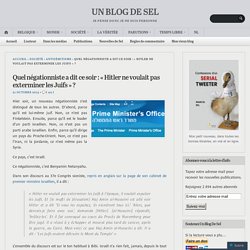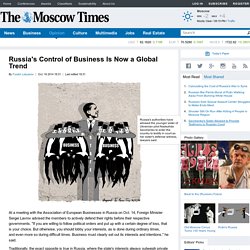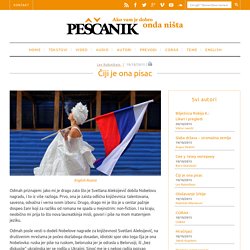

Quel négationniste a dit ce soir : « Hitler ne voulait pas exterminer les Juifs » ? Hier soir, un nouveau négationniste s’est distingué de tous les autres.

D’abord, parce qu’il est lui-même juif. Non, ce n’est pas Finkelstein. Ensuite, parce qu’il est le leader d’un parti israélien. Non, ce n’est pas un parti arabe israélien. Enfin, parce qu’il dirige un pays du Proche-Orient. Ce pays, c’est Israël. Ce négationniste, c’est Benyamin Netanyahu. Dans son discours au 37e Congrès sioniste, repris en anglais sur la page de son cabinet de premier ministre israélien, il a dit : « Hitler ne voulait pas exterminer les Juifs à l’époque, il voulait expulser les Juifs. L’ensemble du discours est sur le ton habituel à Bibi. Et bien sûr, quand Israël a « pris possession de la Judée, de la Samarie et de Gaza », les Israéliens sont « revenu[s] à [leur] patrie ancestrale ».
Il devient difficile de douter du racisme, de l’arabophobie, de l’islamophobie de Benyamin Netanyahu lorsque celui-ci fait peser sur les épaules des Arabes le génocide des nazis. Chacun a choisi son camp. J'aime : Russia's Control of Business Is Now a Global Trend. At a meeting with the Association of European Businesses in Russia on Oct. 14, Foreign Minister Sergei Lavrov advised the members to actively defend their rights before their respective governments.

"If you are willing to follow political orders and put up with a certain degree of loss, that is your choice. But otherwise, you should lobby your interests, as is done during ordinary times, and even more so during difficult times. Business must clearly set out its interests and intentions," he said. Traditionally, the exact opposite is true in Russia, where the state's interests always outweigh private interests.
However, Western sanctions have had a significant impact on economic ties between Russia and the European Union, and a closer look at the relationship between the state and business in the modern world reveals some interesting trends. This was probably the first instance since the imposition of sanctions that a business firmly rejected politically motivated pressure. Čiji je ona pisac. Odmah priznajem: jako mi je drago zato što je Svetlana Aleksijevič dobila Nobelovu nagradu, i to iz više razloga.

Prvo, ona je zaista odlična književnica: talentovana, savesna, odvažna i verna svom izboru. Drugo, drago mi je što je u centar pažnje dospeo žanr koji za razliku od romana ne spada u mejnstrim: non-fiction. I na kraju, neobično mi prija to što nova laureatkinja misli, govori i piše na mom maternjem jeziku. Odmah posle vesti o dodeli Nobelove nagrade za književnost Svetlani Aleksijevič, na društvenim mrežama je počeo dozlaboga dosadan, idiotski spor oko toga čija je ona Nobelovka: ruska jer piše na ruskom, beloruska jer je odrasla u Belorusiji, ili „bez diskusije“ ukrajinska jer se rodila u Ukrajini. Sinoć me je s nekog radija pozvao cvrkutavi glas i pitao to isto: „Koju zemlju i koji narod predstavlja Svetlana Aleksijevič, čiji je ona pisac?
Na dan objave Glavne Nagrade Svih Vremena i Naroda (Всех Времен и Народов) naš pisac je rasejan i vidno usplahiren. Srodni linkovi: Obama Kim. Relations internationales.